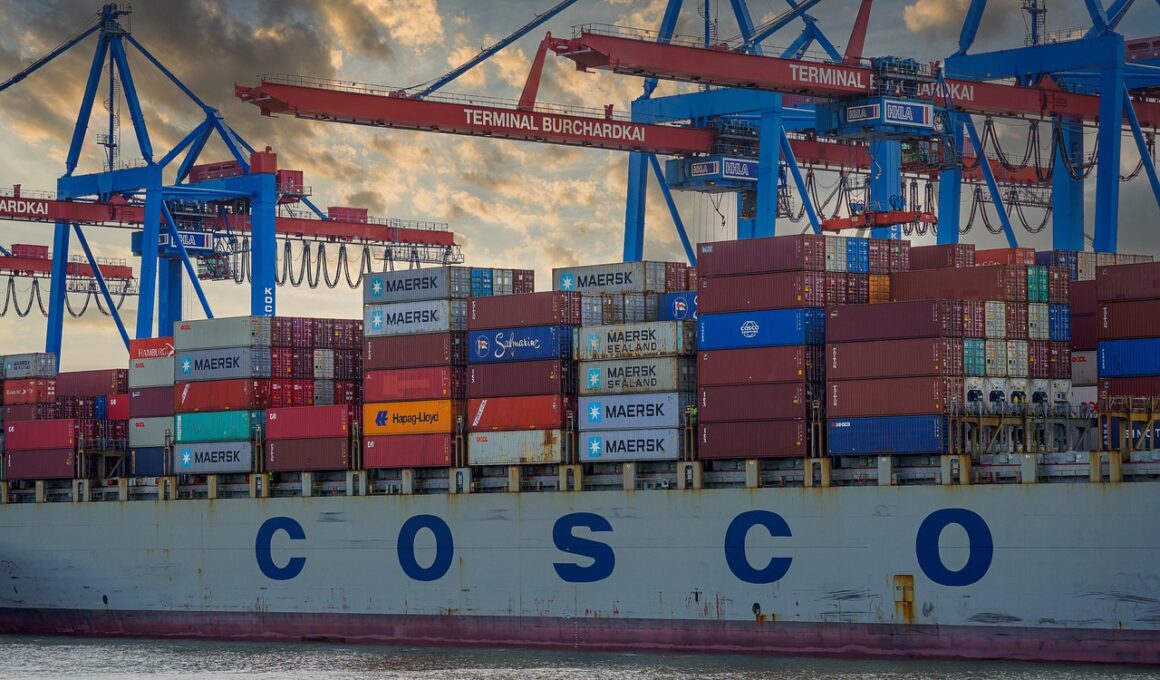The Future of Supply Chain Finance in a Global Economy
In today’s rapidly evolving market, the landscape of supply chain finance has been significantly impacted by globalization and digital transformation. Businesses across the globe are increasingly relying on international trade finance to enhance efficiency and mitigate risks. A crucial factor in this evolution is the adoption of technology, which enables seamless transactions and real-time monitoring. Digital platforms offer innovative solutions that ensure transparency, speed, and reduced transaction costs. As companies expand their reach, access to working capital becomes essential. Developing countries benefit greatly from international trade finance, allowing them to participate in global commerce. Furthermore, the integration of Artificial Intelligence, Big Data, and blockchain technology can enhance decision-making, streamline operations, and foster trust among stakeholders. A unified supply chain finance approach helps organizations align with suppliers and buyers, ultimately driving growth and fostering collaboration. In this environment, understanding the various financing options available is paramount for businesses aiming to thrive in the global arena. More businesses are expected to adopt strategies that involve innovative financing solutions to maintain competitive advantages and sustain their supply chains effectively.
The Role of Technology in Supply Chain Finance
Technology plays a pivotal role in the evolution of supply chain finance, fundamentally transforming how financial transactions are conducted globally. Algorithms powered by Artificial Intelligence analyze data to determine optimal financing solutions for businesses operating across diverse markets. Moreover, blockchain technology offers enhanced security and transparency in trade finance by securely recording transactions, thus minimizing fraud risks. With many companies increasingly engaging in cross-border transactions, the integration of smart contracts automates various processes, facilitating quicker execution and reducing costs. Platforms that incorporate these technological innovations allow firms to assess credit risk more effectively, improving their overall supply chain performance. Additionally, cloud-based solutions provide scalability, enabling companies to adapt their financial operations as their business needs evolve. As competition intensifies, firms leveraging technology in their supply chain finance strategies can gain significant advantages. However, it is essential to address the challenges that come with the adoption of these technologies, such as cybersecurity threats and regulatory compliance. Organizations must stay informed and prepared to navigate this complex landscape as they implement innovative solutions to drive growth and efficiency.
The influence of global regulations on trade finance has never been more critical for businesses immersed in international supply chains. Various regulatory frameworks aim to promote fairness and transparency while also mitigating risks associated with money laundering and other illicit activities. Understanding these regulations is crucial, as they can impose significant challenges on companies seeking to optimize their trade financing strategies. With varying requirements and interpretations across countries, businesses must stay compliant with local laws while navigating the complexities of global commerce. Adapting to these regulations often means investing in compliance technologies and training employees to ensure they are equipped to handle the evolving legal landscape. Furthermore, forging strong relationships with banks and financial institutions can aid in managing compliance requirements effectively. Trade finance professionals need to stay informed on the latest updates from regulatory bodies to ensure their operations are efficient and above board. As businesses embrace new financing models, their ability to adapt quickly to regulatory changes will determine their success in securing the necessary capital to support their international transactions. A proactive approach to compliance will ultimately drive smoother operations.
The Growing Importance of Sustainability
As global awareness of environmental issues rises, sustainability is becoming a key consideration in supply chain finance. Businesses now recognize that a commitment to sustainable practices can create significant value, both to society and their bottom line. Consequently, organizations are increasingly seeking financing options that align with their sustainability goals. Green financing, for example, has emerged as a viable solution for companies aiming to fund projects that benefit the environment. By leveraging such financing, businesses can improve their reputation, attract eco-conscious consumers, and comply with evolving regulations focused on sustainability. Additionally, sustainable practices often lead to operational efficiencies, reducing costs in the long run. Companies that prioritize sustainability in their supply chain finance strategies can enhance resilience and foster innovation, ultimately driving competitive advantages. Integrating social responsibility and ethical considerations within financing models demonstrates a commitment to long-term stakeholder value, which is essential in today’s market. Moreover, collaboration among stakeholders, including suppliers and customers, will heighten the effectiveness of sustainability initiatives. As a result, businesses can expect to attract more investment opportunities and strengthen their relationships within the global supply chain.
The emergence of Fintech companies has brought disruptive change to the traditional supply chain finance landscape. These innovative firms are leveraging technology to offer creative financial solutions, challenging established financial institutions to rethink their approach to trade finance. The agility and customer-centric models adopted by Fintech companies address the growing demand for efficiency and accessibility in the market. Startups and established firms alike are exploring partnerships with these technology-driven companies to enhance their services and improve transaction processes. However, this shift presents both opportunities and challenges for businesses. While the integration of Fintech solutions can streamline operations and reduce costs, companies must also navigate the complexities of fintech partnerships to harness their full potential. Strategic collaborations among stakeholders are essential to create seamless experiences for customers and maximize financing options. Businesses should proactively assess their technological needs and explore opportunities to integrate innovative solutions into their supply chain finance strategies. The evolution of the financial ecosystem represents a significant opportunity for organizations willing to adapt and leverage the capabilities of Fintech for long-term growth and efficiency.
Enhancing Collaboration in the Supply Chain
Collaboration is increasingly recognized as a vital component in optimizing supply chain finance, enabling firms to create synergies that enhance efficiency. Strengthening relationships among stakeholders, including suppliers, customers, and financial institutions, ultimately drives better outcomes for all parties involved. Enhanced communication tools and platforms facilitate more effective information sharing, allowing businesses to make informed decisions regarding financing options. By fostering collaboration, firms can streamline their supply chain operations, address potential bottlenecks swiftly, and establish common goals that yield shared success. Moreover, collaborative financing models, such as reverse factoring and dynamic discounting, offer innovative solutions that can benefit suppliers and buyers alike. As organizations work together toward mutual goals, trust and transparency become paramount, fostering a productive environment for innovation and growth. Businesses are encouraged to implement collaborative frameworks, ensuring all stakeholders are aligned and engaged in the financing process. The pursuit of integrated supply chain solutions can lead to increased financial viability and resilience, enhancing competitiveness in a global economy. Organizations that prioritize collaboration stand to strengthen their supply chain finance strategies significantly.
The future of supply chain finance hinges on adaptability and the ability to respond to ever-changing market conditions. Businesses must maintain flexibility in their financing strategies to navigate fluctuations in demand, supply disruptions, and regulatory changes. By continuously evaluating their operational needs, firms can implement proactive measures to secure financing and sustain growth. Integrating a comprehensive risk management framework empowers organizations to identify potential vulnerabilities in their financial structures and mitigate risks before they escalate. Moreover, training employees to stay abreast of emerging industry trends equips teams with the knowledge necessary to make informed decisions about their supply chain finance. Emphasizing resilience not only safeguards against potential downturns but also positions firms for growth opportunities as markets evolve. Investing in research and development yields beneficial insights that inform our future strategies. Connectivity among businesses, customers, and financial institutions will become increasingly essential as the global economy evolves. Ultimately, organizations committed to flexibility and continuous improvement will emerge as leaders in supply chain finance as they harness the collaborative power of their networks, technology, and innovative solutions. The dynamic landscape will demand strategic foresight and agility.
This article explored the future of supply chain finance in a global economy, focusing on critical factors such as technological advancements, compliance with regulations, and the importance of sustainability. As the landscape transforms, businesses must adapt their strategies to leverage new financing solutions, embrace digital platforms, and foster collaboration among stakeholders. In doing so, they can create a resilient and responsive supply chain finance framework that meets the demands of an ever-changing market. Firms that prioritize strategic agility and innovation will be better positioned to capitalize on growth opportunities while managing risks. By closely monitoring emerging trends and developing a proactive mindset, organizations can effectively navigate the complexities of international trade finance. The increasing interplay between fintech solutions and traditional finance will reshape the industry, offering new avenues for enhancing supply chain operations. Ensuring that the workforce is equipped with the necessary skills and knowledge is vital for success in this rapidly evolving environment. As we move forward, understanding the unique dynamics of global supply chains will enable businesses to thrive in the competitive landscape. Organizations should remain committed to continuous improvement, collaboration, and the pursuit of sustainable practices.


